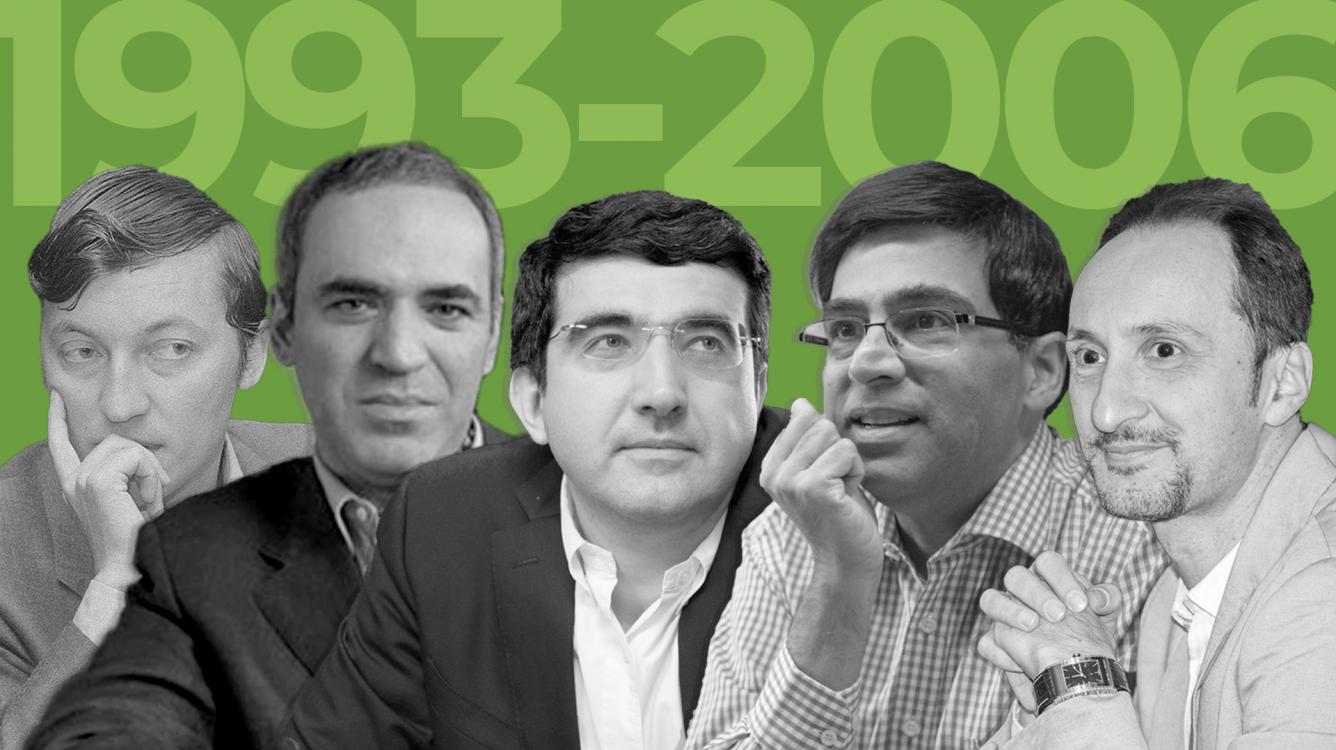
Strongest Chess Players From 1993-2006
The International Chess Federation, commonly referred to by its French acronym FIDE, was established in 1924. At the time, Jose Raul Capablanca was the World Chess Champion, and he continued his reign until 1927. During that time frame, FIDE started to become involved in organizing and awarding the World Champion title. There were some controversies in the years 1924-1945 with regards to which matches and events should determine who was the chess king. In 1946, that all changed, with the start of the FIDE World Chess Championship cycle.
In chess culture, the title of the world's strongest chess player has closely followed the recognized World Chess Champion. Having official matches and an official federation that declares the champion is part of what makes chess such a historically-rich sport. We can follow a lineage of World Chess Champions back to the birthplace of FIDE, and even prior to FIDE there were generally recognized champions.
The Wikipedia page on World Chess Champions nicely summarizes the top players from 1886 to the present.
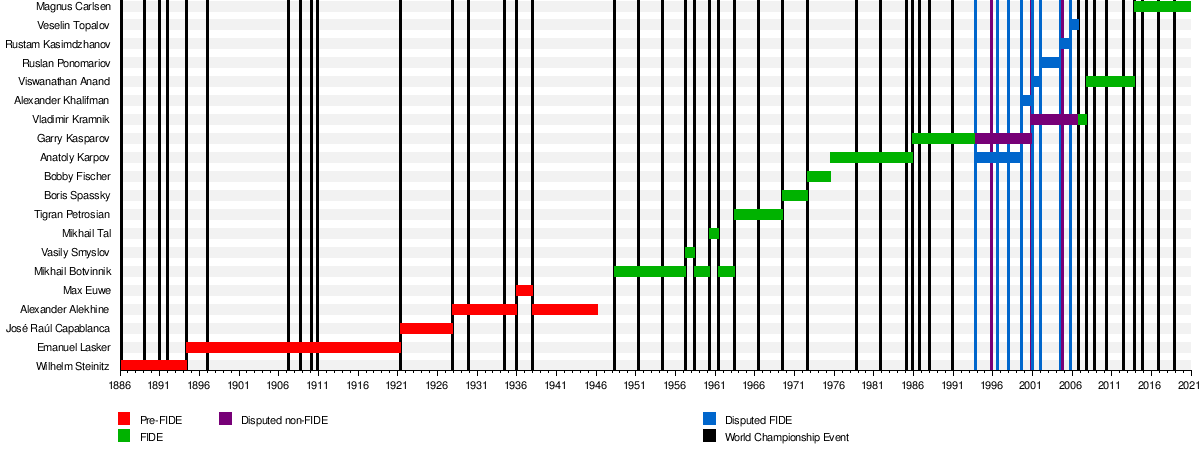
The strongest players at any given time were well understood for most of chess history. However, there is a murky period between 1993 and 2006 when multiple players had different World Championship titles. In this article, I will set out to determine who the strongest players were during this time frame based on yearly performance ratings and tournament results. Let's start with a little history lesson on the FIDE split.
- 1980-1984 Karpov World Champion, Kasparov Closing In
- 1985-1992 Kasparov's Dominance
- Title Splits In Two
- 1993-1999 Karpov FIDE Champion, Kasparov PCA Champion
- 2000-2002 Anand Wins FIDE Crown, Kramnik Defeats Kasparov
- 2003-2004 Kasparov And Kramnik Less Active
- 2005-2006 Topalov Takes FIDE Title
- Final Thoughts
1980-1984 Karpov World Champion, Kasparov Closing In
In 1985, GM Garry Kasparov defeated then-champion GM Anatoly Karpov, in what Mike Klein deemed as the fifth-greatest chess match of all-time. Karpov had reigned as champion for about ten years (1975-1985) prior to Kasparov overtaking him. From 1980-1984, Kasparov's performance rating (2671) was within one point of Karpov's 2672. To give you an idea of how dominant these two giants were, the third-highest performance rating among players with over 100 games was Viktor Korchnoi (2614). A gap of over 50 points over a five-year stretch really set these two players apart.
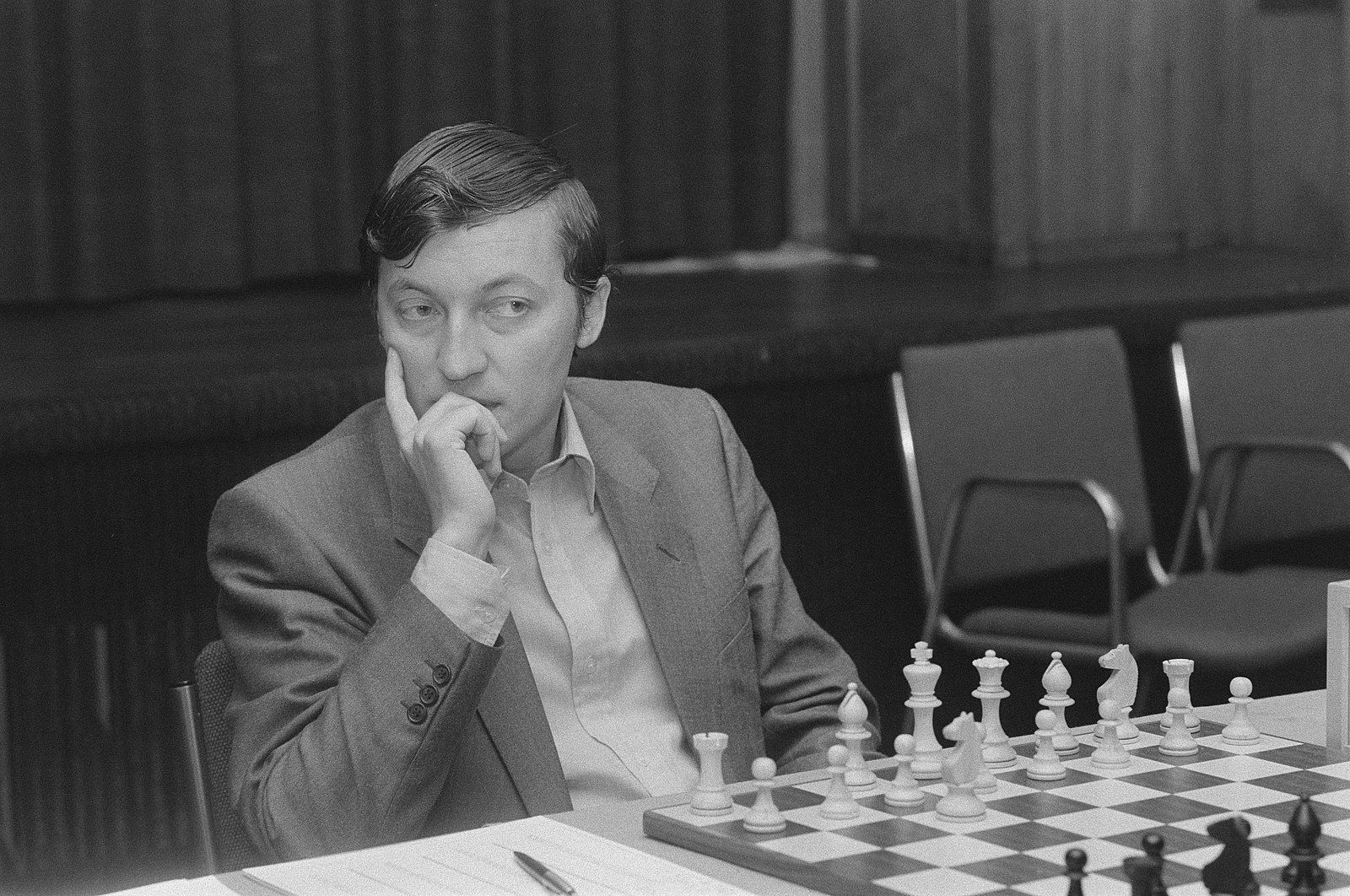
1985-1992 Kasparov's Dominance
Between 1985 and 1992, Garry Kasparov held the highest performance rating every year. The average gap between Kasparov and the next highest performance was an astonishing 36 points! Besides Karpov, names that filled the number two spot were GMs Boris Gelfand, Evgeny Bareev (1990), and Vassily Ivanchuk (1991). The top five players during this time frame based on performance rating were:
- Garry Kasparov (2697 performance)
- Anatoly Karpov (2659)
- Vassily Ivanchuk (2616)
- Valery Salov (2607)
- Nigel Short (2597)
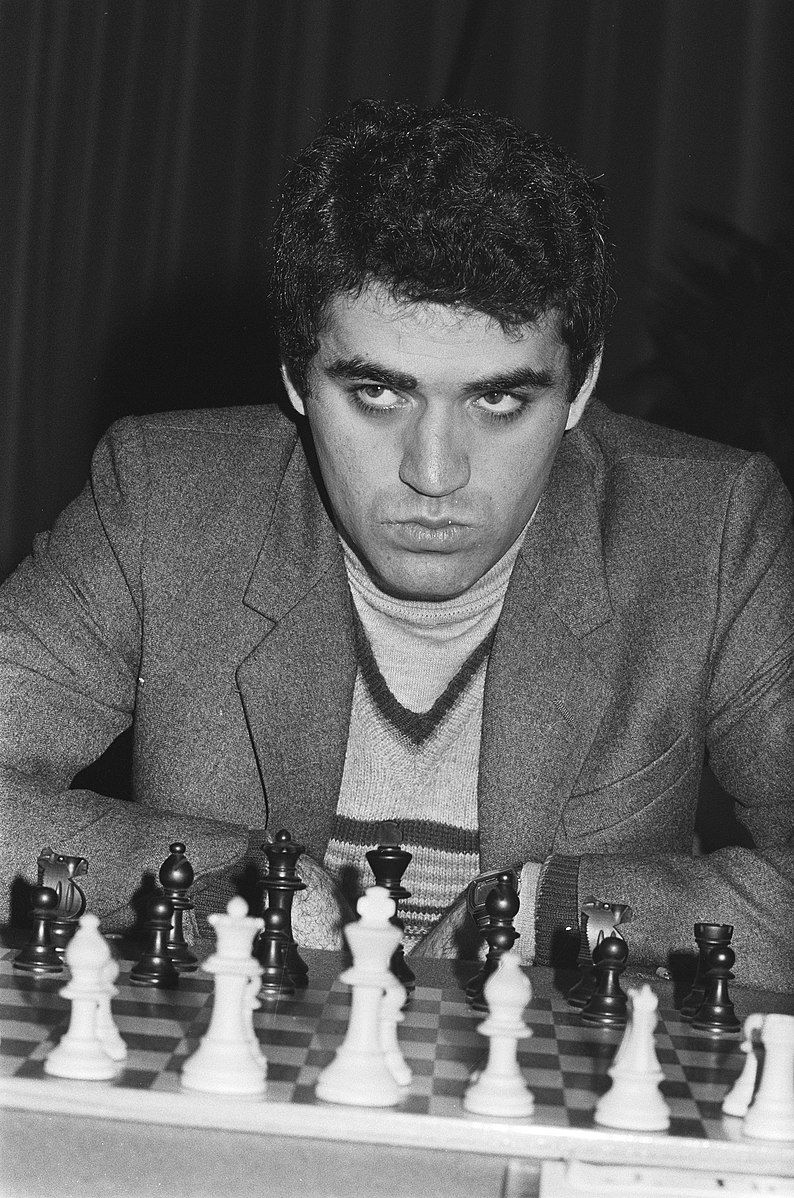
Title Splits in Two
In the semi-finals of the 1991-1993 FIDE Candidates cycle, Nigel Short defeated consistent World number #2 Karpov, 6-4. This shocked the world, as noted by this 1993 Sun Sentinel headline "KARPOV ELIMINATED IN CANDIDATES' SEMIS". Short went on to win the candidates, defeating Jan Timman 7.5-5.5, and earning the right to challenge Kasparov for the title. Kasparov and Short were not happy with how FIDE was organizing their championship match, and the two formed the Professional Chess Association (PCA). In the next sections, I will determine who I believe was the strongest player during each era when we had two champions.
1993-1999 Karpov FIDE Champion, Kasparov PCA Champion
Between 1993 and 1997, the two giants only played each other four times. Kasparov defeated Karpov twice, and they had two draws. Kasparov had a performance rating of 2737 over the stretch to Karpov's 2667. It is interesting to note that Viswanathan Anand and Vladimir Kramnik had performance ratings of 2740 and 2719, respectively. During this stretch, Kasparov bested Anand 20.5-10.5, including defeating Anand in the 1995 PCA World Championship 10.5-7.5. In 1999, GM Alexander Khalifman won the FIDE World Championship Knockout. His performance rating was a respectable 2671 for the year, but Kasparov proved why he is one of the greatest of all time with a performance rating of 2825!
Strongest Player 1993-1999: Garry Kasparov
2000-2002 Anand Wins FIDE Crown, Kramnik Defeats Kasparov
Kramnik won a historic match in 2000, defeating Kasparov at the Brain Games World Chess Championship 8.5-6.5. Kramnik also got the better of Kasparov during this full stretch with a score of 14-13. Despite the match loss, Kasparov's performance rating from 2000-2002 was the highest in the world at 2781, and Kramnik's was 2712. In 2000 though, Kramnik had the top performance rating (2812!), prior to having some health issues starting in 2001.
Anand won the FIDE title in 2000 and had the second-highest performance rating at 2746. Anand lost the head-to-head battles with Kasparov (4.5-3.5) and Kramnik (5.5-3.5). Past FIDE champion Khalifman's performance was 2681, and the next FIDE champion Ruslan Ponomariov's performance was 2717. Other players with performance ratings over 2700 were Peter Leko (2712), Michael Adams (2710), and Bareev (2704).

Strongest Player: 2000 Vladimir Kramnik, 2001-2002 Garry Kasparov
2003-2004 Kasparov and Kramnik Less Active
Rustam Kasimdzhanov won the FIDE championship in 2003 and had a performance rating of 2671 during the two-year stretch. Active players with performance ratings in the 2700s included Alexander Morozevich (2764), Peter Svidler (2733), Ivanchuk (2726), Adams (2724), Alexei Shirov (2718), and Alexander Grischuk (2707).
Kramnik (2733) and Kasparov (2728) were both less active during the stretch. The most impressive player by far though was Anand, with a performance rating of 2803! Anand won the Corus 2003 and 2004 events, and the Dortmund 2004 tournament. Truly an impressive performance.
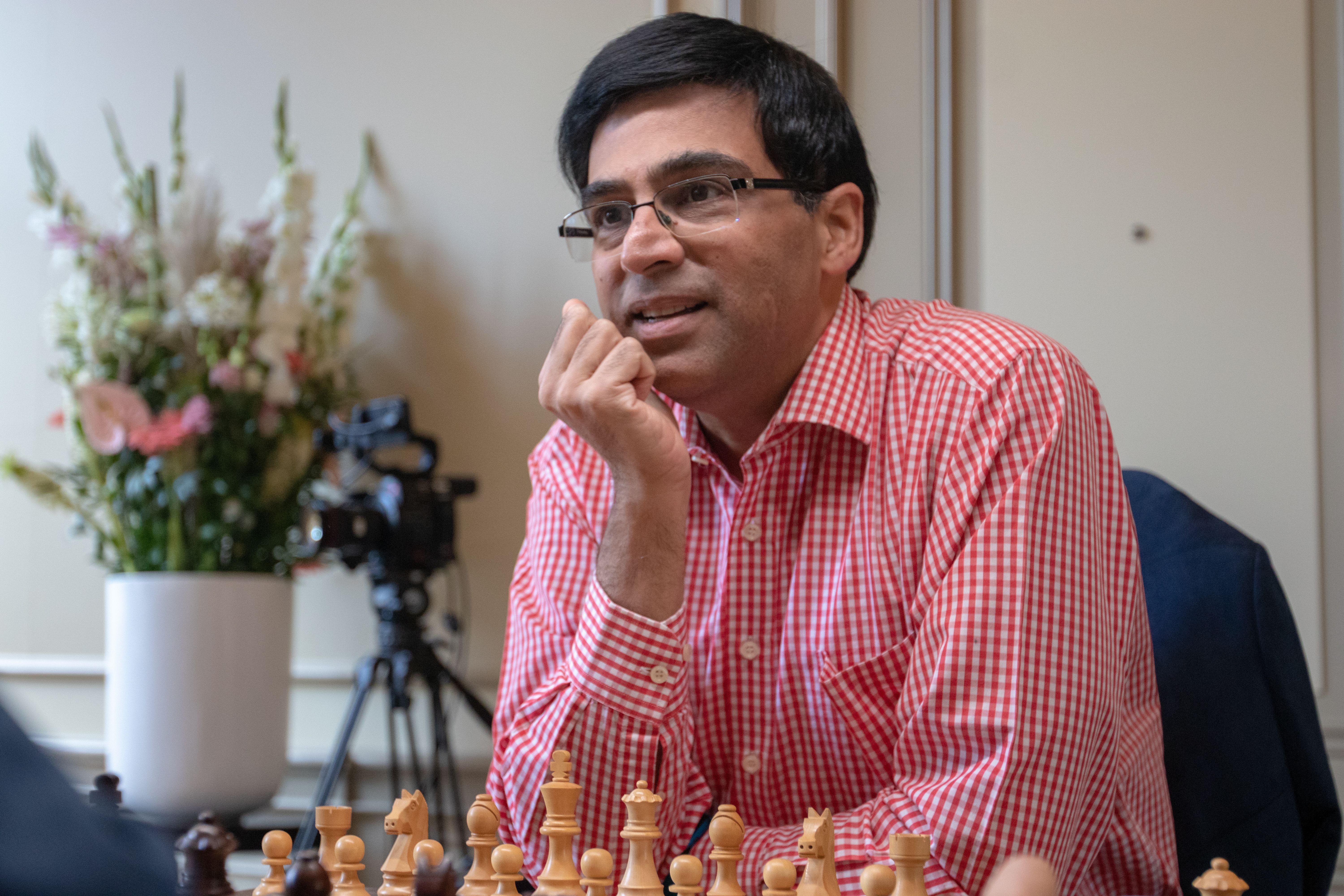
Strongest Player 2003-2004 Viswanathan Anand
2005-2006 Topalov Takes FIDE Title
In 2005, Veselin Topalov won the FIDE World Championship, which was a more rigorous double round-robin format. Topalov went undefeated, scored 10/14, and beat the field by 1.5 points. The event included top players Anand, Svidler, Morozevich, Leko, Kasimdzhanov, Adams, and Judit Polgar. Topalov went on to lose to Kramnik in the 2006 reunification match.
Topalov had a 2806 performance rating over the two-year period. Anand was close at 2775, but no one could compete with Veselin's performance over this stretch. In 2005, he won events at Linares, MTel Masters, and the FIDE World Championship. In 2006 he won the MTel Masters and placed second in Linares. Oh and he was also 2nd in Dortmund 2005 and 3rd in Corus 2005.

Strongest Player 2005-2006: Veselin Topalov
Final Thoughts
During one of the murkier times in chess championship history, many players can claim to be the best during at least one stretch. Here are my top players from 1993-2006 based on performance ratings, head-to-head results, and tournament results.
- 1993-1999: Garry Kasparov
- 2000: Vladimir Kramnik
- 2001-2002: Garry Kasparov
- 2003-2004: Viswanathan Anand
- 2005-2006: Veselin Topalov
What are your thoughts on the strongest players from 1993-2006? Let us know in the comments below!




